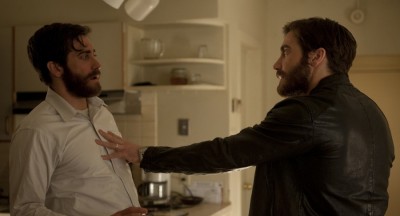Enemy
Now playing.
If you want to nitpick Enemy, the film offers plenty of ammunition, as it takes itself very seriously. The premise is simple: a history teacher (Jake Gyllenhaal) spots his doppelganger in a movie, and the two men’s lives collide. The fear and gravity with which they treat the situation is kind of ridiculous. I’ve had the experience of meeting someone who looks just like me, and it’s not that otherworldly. I laughed out loud when I saw the luxurious condo of a Toronto actor who apparently has only three minor roles to his credit. But, despite all its problems, Enemy really worked on me.
One thing that makes the film work is its lack of pretension. Despite its seriousness, director Denis Villeneuve (Polytechnique) understands that he’s not making Lawrence of Arabia; he’s making a textbook psychological thriller, and it’s a cinematic tradition he understands. The influence of Hitchcock is all over Enemy, with paranoia, mistaken identities, and sexual transgressions oozing from its every pore. The score by Danny Bensi and Saunder Jurriaans reminded me of Bernard Hermann’s work with Hitchcock, recalling the dread-filled music of Vertigo and Psycho.
Despite the obvious influence of Hitchcock (and such more recent psychological thrillers as Memento or Black Swan), Enemy has a life of its own. The visual style, while hardly revolutionary, is appropriately striking. The portrayal of an uncharacteristically murky Toronto (which is rarely shot for Toronto) adds to the movie’s claustrophobia, and Villeneuve knows just how to frame and block his shots so as to make his audience feel uneasy without letting them know why.
“Not knowing why” is central to the experience of watching Enemy. The film’s spiralling logic riddles the movie with ambiguity. Even by the end, there are no easy answers. The editing emphasizes discontinuity, and Gyllenhaal’s performances lets you in on what his characters are feeling, without telling you what they’re thinking. It’s a labyrinthine maze of a movie, and I had fun getting lost.
Published in Volume 68, Number 24 of The Uniter (March 19, 2014)








